Iran’s Gas Consumption Hits New Record As Cold Spell Lingers

Gas consumption in Iran has hit a new record, prompting the oil minister to urge people to wear warm clothes and turn off heating when leaving home and work.

Gas consumption in Iran has hit a new record, prompting the oil minister to urge people to wear warm clothes and turn off heating when leaving home and work.
Iran's oil minister Javad Owji said on Sunday that with people’s cooperation gas consumption can be managed, urging people to reduce usage so that “we can pass the next 10 days without any problem."
Owji said that the gas consumption at homes, commercial and small industries was at 692 million cubic meters in the past 24 hours.
Moreover, the head of distribution at Iran’s National Gas Company, Mohammadreza Joulaei, said that cold weather in the coming days will increase consumption by a few million cubic meters per day as people turn up their heaters.
Joulaei said, “There are 28 million gas subscribers in the country,” warning that power plants and industries such as petrochemicals and steel would face supply cuts to provide gas to households.
With a cold spell gripping Iran in recent days and a surge in demand, shortages of natural gas have become acute and power stations are burning more dirty fuels, feeding air pollution.
Iran has the second largest reserves of natural gas in the world but is barely able to satisfy domestic demand as production steadily declines because of lack of investments in the oil and gas sector.

China is now the single largest investor and trading partner to 11 Middle Eastern countries, thanks primarily to its Belt and Road Initiative (BRI), a global, multi-trillion-dollar project.
China has significantly increased its economic, political, and security footprint in the Middle East through the BRI during the past decade. The ‘Belt’ runs from China, through South and Central Asia, and into Europe. The Maritime “road” connects coastal Chinese cities with Africa and the Mediterranean.
The Center for Economics and Business Research (CEBR) reported that China’s Belt and Road Initiative is likely to boost world GDP by $7.1 trillion annually within the next two decades. As attractive as that might sound, in addition to economic activity, China has geopolitical motivations behind its Belt and Road Initiative.
According to The Guardian, BRI projects have left 165 countries collectively owing a massive $385 billion to China. China systematically underreports stats like this to international bodies, such as the World Bank.
The Information office of the Chinese government reports the BRI has created more than 244,000 jobs for locals overseas. However, a vast majority of BRI projects require the use of Chinese companies, labor, and raw materials, meaning the GDP gains from BRI will go to the Chinese ‘locals,’ not to the locals of the countries in which China has invested.
Energy Security of People’s Republic of China
China’s top economic agencies have singled out “security” as a priority for 2022. In other words, securing the supplies of everything from grains to energy and raw materials. According to The Brookings Institution, “China’s growing role in the Middle East is positioning the rising superpower in direct confrontation with shifting U.S. interests in the domains of energy security, Israel, and Iran.”. The US finds itself reducing its footprint in the Middle East and shifting its focus towards the Asia-Pacific, giving China the opportunity to expand its influence in the region. Chinese economic dominance may invite similar regional skirmishes as the country seems happy to leverage risky debt against the countries it invests in to get what it wants diplomatically.
China’s relationship with the Middle East revolves primarily around Energy and the BRI. The Middle East and North Africa (MENA), a collective of 19 counties, has vast oil, petroleum, and natural gas reserves, making it attractive to China.
According to China Global Investment Tracker, Beijing heavily depends on Middle Eastern oil and gas. In addition to energy security, China’s strong diplomatic ties with MENA countries are vital to implementing BRI across several continents. Chinese State-owned lenders have been financing projects in Egypt, Iran, Saudi Arabia, Oman, the United Arab Emirates, and Djibouti, where Beijing has established its only overseas military base.
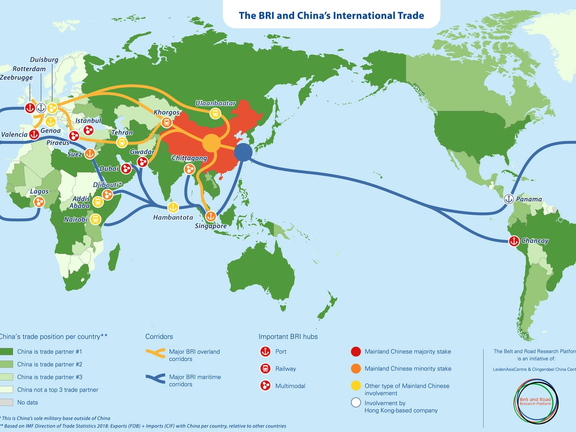
Djibouti, located in ‘The Horn of Africa’, also hosts U.S., French, and Japanese military bases. The international interest in Djibouti lies in the Bab El-Mandeb Strait, a strategic route for oil and natural gas shipments, connecting the Red Sea and the Indian Ocean. Its location makes the choke point geopolitically and economically significant.
The Energy Information Administration (EIA) reports, approximately “6.2 million barrels per day of crude oil, condensate, and refined petroleum products flowed through the Bab El-Mandeb Strait towards Europe, the United States, and Asia.” One-third of the world’s ships transporting energy and cargo must pass through the strait. Bab El-Mandeb is one among a series of trade and energy corridors in which China has invested stretching from the South China Sea to the Arabian Sea, referred to by India as a “String of Pearls.” India sees this investment as a sign of China’s growing military and trade prowess in the region. Indian critics are worried the BRI is a military initiative, aiming to give the Chinese Navy better access to the Indian Ocean.
China’s maritime “road” now stretches from western Xinjiang, through India, into the Persian Gulf. To implement BRI, China will need to achieve energy security within the Middle East, to keep its pace of development. To achieve energy security, China needs bases at every strategic port and chokepoint. As for the Gulf states’ approval of China, Iran announced the opening of a Chinese consulate in Bandar-Abbas, Iran’s most significant trading and military port on December 29th, 2021. Beijing has maintained close ties with Iran amid nuclear negotiations with the U.S. Iran recently signed a 25-year cooperation agreement with China, allowing China to invest $400 billion over 25 years in Iran. The Supreme Leader of Iran, Ayatollah Ali Khamenei, said, “The Islamic Republic will never forget China’s cooperation during the sanctions era.” It is essential to keep in mind, Iran’s cooperation with China may be a non-calculated reaction to its bad relations with the United States, and not a calculated strategic move on Teheran’s part, for its long-term development and international trade.Sorely needed economic injection investee countries like Iran, will receive from China, position China to earn favorable diplomatic preference throughout the developing regions through which BRI is implemented.
Debt-Trap-Diplomacy or Investee’s Incompetence?
China has been accused of strategically ensnaring investees with “debt-trap- diplomacy.” Unsustainable debt and the constrictive terms of Chinese loans have come under increased scrutiny in recent years, as more countries sign deals with China’s state-owned lenders. Concerns have centered particularly around some clauses that allow Chinese entities to seize property or assets when payments can’t be met. This has prompted worries of seizures of land or other assets, or debts that leave governments beholden to Beijing.
MI6 chief Richard Moore warned the BBC that China’s approach to loans often incorporates debt and data traps, which threaten to “erode sovereignty and have prompted defensive measures.”To vividly illustrate what Chinese debt traps look like in practice, observe the cases of Sri Lanka, Kyrgyzstan, and Montenegro, which are all falling short on their loan obligations to China, which refuses them self-sustainable growth.
Sri Lanka is currently experiencing a financial crisis from debts owed to China for highways, ports, airports, and a coal power plant. Sri Lanka’s President, Gotabaya Rajapaksa, has requested that China consider restructuring Sri Lanka’s debt repayments. According to Reuters, over the last decade, China has lent Sri Lanka over $5 billion.” Critics say China uses white elephant projects with low returns, which China has denied.
Similarly, Kyrgyzstan owes 40% of its foreign debt, $1.8 billion, to Chinese lenders. They grapple with repayments and meeting deadlines as the country faces financial troubles brought on by the COVID-19 pandemic.
In Montenegro, worries flared up after the government requested help from the European Union (EU) to pay off a $1 billion Chinese loan for a controversial, ongoing highway project. Montenegro’s economy is on the verge of derailment as a result: Montenegro’s debt has climbed to 100% of its GDP due to this project.What’s worse, “once completed, the road won't lead anywhere anyway. We make a joke: It is ahighway from nothing to nothing," says the country's former Justice Minister, Dragan Soc. The EU’s refusal to help Montenegro to pay its debt is an opportunity for China to grow its influence and foothold in Europe. Scott Morris, a senior fellow at the Center for Global Development says, “China is the top lender in the world, so it matters how it approaches these contracts.” Morris continues, “the general conclusion after looking at the contracts is that Chinese entities are issuing loans with the full intention of getting their money back.” China seems equally happy to swap debt for rights, ownership, and influence when the prospect of financial repayment becomes bleak for investees.
The ‘Non-Interference’ Policy, a False Sense of Security
China is using a ‘Non-interference’foreign policy, to differentiate its approach from the US, creating a false sense of security, as the very nature of BRI is invasive. China’s ’Non-interference’ policy, combined with the implementation of the BRI’s opaque contracts, creates opportunities for China to prevent having to take accountability for its actions abroad, similarly to how it’s already doing so domestically.
China needs the GCC’s approval to gain energy security in the region. Chinese Foreign Ministry spokesperson, Wang Wenbin said the Gulf Cooperation Council (GCC) Secretary-General, Nayef Falah Al-Hajraf, expressed firm support for China’s “legitimate positions on issues related to Taiwan, Xinjiang and human rights,” when the GCC members met with Chinese officials in Beijing early January of 2022. Wang continued to say they have expressed opposition to “politicization of human rights issues.”
United Nations revealed in 2018, that China has detained more than a million Muslim Uyghurs in the Xinjiang region as part of a campaign to wipe out their traditional culture, language, and beliefs. Al-Hajraf’s support of China’s detainment of Uyghurs, on behalf of the GCC—a body representing more than 54 million Muslims—sets an unsettling precedent for the way those populations may get treated in MENA countries through which the BRI extends.
China’s ‘Non-Interference’ foreign policy seems to be gaining attraction among authoritarian countries with stagnant economies; one being Iran. The Iran-China 25-year Cooperation Agreement is signed at a time when Iran is politically and economically isolated, which could have affected the terms of the agreement. The BRI’s record of economy-crippling projects in countries with economies stronger than Iran’s means that Iran may have a difficult 25 years ahead.
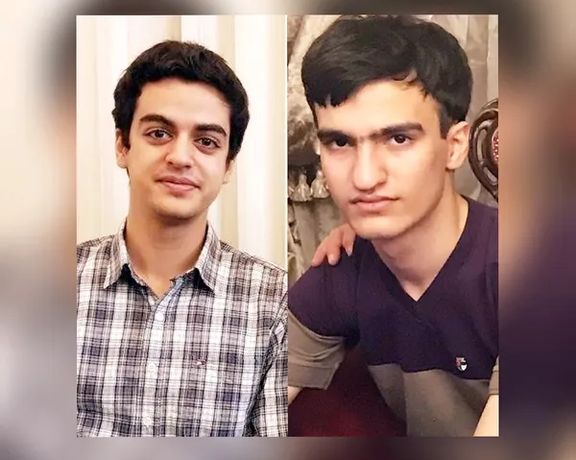
Several Nobel Laureates and distinguished academics in a letter have urged the United Nations to intervene for the release of two top university students imprisoned in Iran.
Ali Younesi and Amirhossein Moradi who are only 21 years old, have been held in harsh conditions of the notorious 209 section of the Evin prison since April 2020 for alleged political activities.
In the letter addressed to Secretary-General Antonio Guterres and High Commissioner for Human Rights Michelle Bachelet, the scholars called on the UN to make every effort to ensure that political prisoners in Iran, particularly the two students, are released immediately.
The signatories said both award-winning students have been suffering physical and mental torture and other ill-treatment, including forced confessions.
Laureates Barry Barish, David Wineland, Randy Schekman, Richard Roberts, Martin Chalfie as well as MIT professor Noam Chomsky are among the signatories.
In May 2021, more than 170 professors and students of Sharif University wrote a letter to the Iranian authorities demanding the release of the two, while Amnesty International has released two calls for “Urgent Action” over their case.
Younesi, who was the winner of the gold medal in the International Astronomy Olympiad in 2018 in China, was arrested in April 2020 along with Moradi, another award-winning physics student at Sharif University. They are charged with “corruption on earth”, which is punishable by death in Iran.
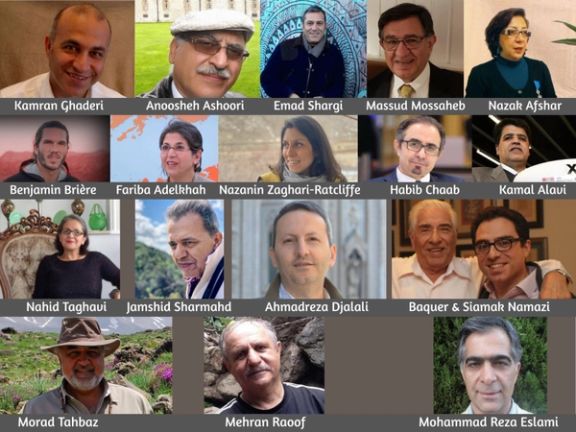
A dual national jailed in Iran has started a hunger strike in solidarity with Barry Rosen, a former hostage, who has launched a campaign at Vienna talks to draw attention to those held by Tehran.
In a tweet on Sunday, his daughter Elika saidAnoushehAshoori has joined Rosen and other hunger striking activists from his cell in Tehran's Evin prison, demanding release of all foreign hostages.
Ashoori, a British-Iranian businessman, is one of several dual nationals who are in detention in Iran on unsubstantiated charges. Ashoori has been sentenced to 10 years in prison on alleged spying for Israel.
Rosen’s hunger strike In Vienna is gathering momentum as Nizar Zakka, a Lebanese former hostage in Iran, and UK-based Iranian journalist and activist Jamshid Barzegar have also joined the sit-in.
Rosen, the former US diplomat held hostage in Iran for 444 days four decades ago, said in a tweet on Sundaythat he is feeling “very weakened but buoyed” that others are joining the campaign.
While the negotiations in Vienna are centered on reviving the 2015 nuclear agreement, the JCPOA, many have raised the issues of Iran’s human rights record and its support for militant organizations in the Middle East. There is no indication that any of these concerns are dealt with at the talks.
Iran has detained many foreigners and dual nationals who have visited the country and used them as bargaining chips against Western countries, according to human rights organizations.
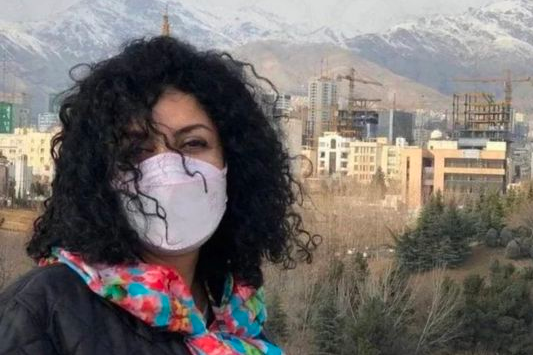
In a five-minute trial a court in Iran has sentenced prominent political prisoner Narges Mohammadi to eight years in jail and 70 lashes, her husband announced.
Mohammadi was arrested in Novemberlast year at the death anniversary ceremony of a victim shot dead by security forces during the November 2019 protests, reportedly while shopping.
She has been to jail several times over the past two decades. She was freed from Evin Prison in September 2020 after serving more than five years when she had no contact with her husband and children for long periods of time.
Persecution of human rights and political activists and execution have increased since hardliner president Ebrahim Raisi took office last August.
Keyvan Samimi, another activist-turned-prisoner, was transferred from Evin late last week, and is being kept in quarantine in Karaj Central Prison.
Samimi has said he will stage a hunger strike, if he is not moved back to Evin, where Iran keeps most of its political prisoners.
An Iranian human rights monitoring group based abroad has reported over 2,300 protest rallies in the countryin 2021, with most events related to labor issues.
Iran executed 299 individuals in 2021, including four juvenile offenders - a 26-percent increase compared with 2020. Courts issued 85 death sentences until December 20.
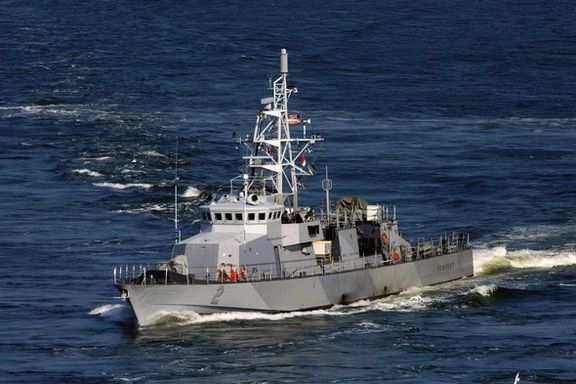
The US 5th Fleet interdicted a stateless fishing vessel in the Gulf of Oman carrying 40 tons of urea fertilizer that can also be used to make explosives.
“Guided-missile destroyer USS Cole (DDG 67) and patrol coastal ship USS Chinook (PC 9) interdicted the stateless vessel transiting from Iran in waters outside of any state’s territorial sea along a route historically used to traffic weapons to the Houthis in Yemen,” a statement by the 5th Fleet said on Sunday.
The same vessel was caught in February 2021 smuggling illicit weapons off the coast of Somalia apparently for Houthi rebels in Yemen, but it is not clear how the vessel was allowed to go free.
The interdiction took place on January 18, the 5th Fleet said, and the ship was transferred to Yemen’s coastguard with its cargo and crew of five.
In December, the US Navy seized another shipin the Arabian Sea originating from Iran that was carrying 1,400 AK-47 assault rifles and 226,600 rounds of ammunition. The vessel was transiting “international waters along a route historically used to traffic weapons to the Houthis in Yemen,” a Navy statement said at the time.
The 5th Fleet operates in the waters of the Middle East, from the Red Sea to the Persian Gulf in an area encompassing 2.5 million square miles.